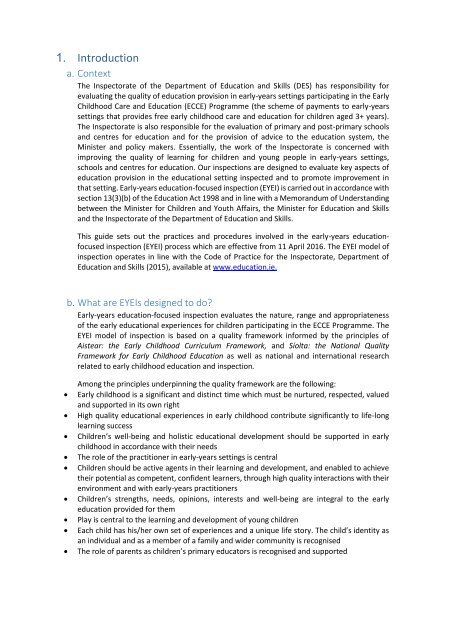A-Guide-to-Early-years-Education-focused-Inspection-EYEI-in-Early-years-Settings-Participating-ECCE-Programme
A-Guide-to-Early-years-Education-focused-Inspection-EYEI-in-Early-years-Settings-Participating-ECCE-Programme
A-Guide-to-Early-years-Education-focused-Inspection-EYEI-in-Early-years-Settings-Participating-ECCE-Programme
Create successful ePaper yourself
Turn your PDF publications into a flip-book with our unique Google optimized e-Paper software.
D<br />
1. Introduction<br />
a. Context<br />
The Inspec<strong>to</strong>rate of the Department of <strong>Education</strong> and Skills (DES) has responsibility for<br />
evaluat<strong>in</strong>g the quality of education provision <strong>in</strong> early-<strong>years</strong> sett<strong>in</strong>gs participat<strong>in</strong>g <strong>in</strong> the <strong>Early</strong><br />
Childhood Care and <strong>Education</strong> (<strong>ECCE</strong>) <strong>Programme</strong> (the scheme of payments <strong>to</strong> early-<strong>years</strong><br />
sett<strong>in</strong>gs that provides free early childhood care and education for children aged 3+ <strong>years</strong>).<br />
The Inspec<strong>to</strong>rate is also responsible for the evaluation of primary and post-primary schools<br />
and centres for education and for the provision of advice <strong>to</strong> the education system, the<br />
M<strong>in</strong>ister and policy makers. Essentially, the work of the Inspec<strong>to</strong>rate is concerned with<br />
improv<strong>in</strong>g the quality of learn<strong>in</strong>g for children and young people <strong>in</strong> early-<strong>years</strong> sett<strong>in</strong>gs,<br />
schools and centres for education. Our <strong>in</strong>spections are designed <strong>to</strong> evaluate key aspects of<br />
education provision <strong>in</strong> the educational sett<strong>in</strong>g <strong>in</strong>spected and <strong>to</strong> promote improvement <strong>in</strong><br />
that sett<strong>in</strong>g. <strong>Early</strong>-<strong>years</strong> education-<strong>focused</strong> <strong>in</strong>spection (<strong>EYEI</strong>) is carried out <strong>in</strong> accordance with<br />
section 13(3)(b) of the <strong>Education</strong> Act 1998 and <strong>in</strong> l<strong>in</strong>e with a Memorandum of Understand<strong>in</strong>g<br />
between the M<strong>in</strong>ister for Children and Youth Affairs, the M<strong>in</strong>ister for <strong>Education</strong> and Skills<br />
and the Inspec<strong>to</strong>rate of the Department of <strong>Education</strong> and Skills.<br />
This guide sets out the practices and procedures <strong>in</strong>volved <strong>in</strong> the early-<strong>years</strong> education<strong>focused</strong><br />
<strong>in</strong>spection (<strong>EYEI</strong>) process which are effective from 11 April 2016. The <strong>EYEI</strong> model of<br />
<strong>in</strong>spection operates <strong>in</strong> l<strong>in</strong>e with the Code of Practice for the Inspec<strong>to</strong>rate, Department of<br />
<strong>Education</strong> and Skills (2015), available at www.education.ie.<br />
b. What are <strong>EYEI</strong>s designed <strong>to</strong> do?<br />
<strong>Early</strong>-<strong>years</strong> education-<strong>focused</strong> <strong>in</strong>spection evaluates the nature, range and appropriateness<br />
of the early educational experiences for children participat<strong>in</strong>g <strong>in</strong> the <strong>ECCE</strong> <strong>Programme</strong>. The<br />
<strong>EYEI</strong> model of <strong>in</strong>spection is based on a quality framework <strong>in</strong>formed by the pr<strong>in</strong>ciples of<br />
Aistear: the <strong>Early</strong> Childhood Curriculum Framework, and Síolta: the National Quality<br />
Framework for <strong>Early</strong> Childhood <strong>Education</strong> as well as national and <strong>in</strong>ternational research<br />
related <strong>to</strong> early childhood education and <strong>in</strong>spection.<br />
<br />
<br />
<br />
<br />
<br />
<br />
<br />
<br />
<br />
Among the pr<strong>in</strong>ciples underp<strong>in</strong>n<strong>in</strong>g the quality framework are the follow<strong>in</strong>g:<br />
<strong>Early</strong> childhood is a significant and dist<strong>in</strong>ct time which must be nurtured, respected, valued<br />
and supported <strong>in</strong> its own right<br />
High quality educational experiences <strong>in</strong> early childhood contribute significantly <strong>to</strong> life-long<br />
learn<strong>in</strong>g success<br />
Children’s well-be<strong>in</strong>g and holistic educational development should be supported <strong>in</strong> early<br />
childhood <strong>in</strong> accordance with their needs<br />
The role of the practitioner <strong>in</strong> early-<strong>years</strong> sett<strong>in</strong>gs is central<br />
Children should be active agents <strong>in</strong> their learn<strong>in</strong>g and development, and enabled <strong>to</strong> achieve<br />
their potential as competent, confident learners, through high quality <strong>in</strong>teractions with their<br />
environment and with early-<strong>years</strong> practitioners<br />
Children’s strengths, needs, op<strong>in</strong>ions, <strong>in</strong>terests and well-be<strong>in</strong>g are <strong>in</strong>tegral <strong>to</strong> the early<br />
education provided for them<br />
Play is central <strong>to</strong> the learn<strong>in</strong>g and development of young children<br />
Each child has his/her own set of experiences and a unique life s<strong>to</strong>ry. The child’s identity as<br />
an <strong>in</strong>dividual and as a member of a family and wider community is recognised<br />
The role of parents as children’s primary educa<strong>to</strong>rs is recognised and supported


